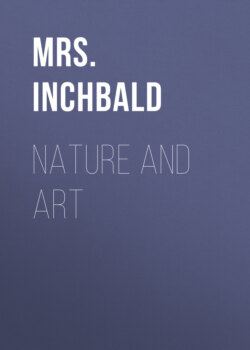Читать книгу Nature and Art - Mrs. Inchbald - Страница 8
На сайте Литреса книга снята с продажи.
CHAPTER V.
ОглавлениеTable of Contents
The incumbent of this living died—William underwent the customary examinations, obtained successively the orders of deacon and priest; then as early as possible came to town to take possession of the gift which his brother’s skill had acquired for him.
William had a steady countenance, a stern brow, and a majestic walk; all of which this new accession, this holy calling to religious vows, rather increased than diminished. In the early part of his life, the violin of his brother had rather irritated than soothed the morose disposition of his nature: and though, since their departure from their native habitation, it had frequently calmed the violent ragings of his hunger, it had never been successful in appeasing the disturbed passions of a proud and disdainful mind.
As the painter views with delight and wonder the finished picture, expressive testimony of his taste and genius; as the physician beholds with pride and gladness the recovering invalid, whom his art has snatched from the jaws of death; as the father gazes with rapture on his first child, the creature to whom he has given life; so did Henry survey, with transporting glory, his brother, dressed for the first time in canonicals, to preach at his parish church. He viewed him from head to foot—smiled—viewed again—pulled one side of his gown a little this way, one end of his band a little that way; then stole behind him, pretending to place the curls of his hair, but in reality to indulge and to conceal tears of fraternal pride and joy.
William was not without joy, neither was he wanting in love or gratitude to his brother; but his pride was not completely satisfied.
“I am the elder,” thought he to himself, “and a man of literature, and yet am I obliged to my younger brother, an illiterate man.” Here he suppressed every thought which could be a reproach to that brother. But there remained an object of his former contempt, now become even detestable to him; ungrateful man. The very agent of his elevation was now so odious to him, that he could not cast his eyes upon the friendly violin without instant emotions of disgust.
In vain would Henry, at times, endeavour to subdue his haughtiness by a tune on this wonderful machine. “You know I have no ear,” William would sternly say, in recompense for one of Henry’s best solos. Yet was William enraged at Henry’s answer, when, after taking him to hear him preach, he asked him, “how he liked his sermon,” and Henry modestly replied (in the technical phrase of his profession), “You know, brother, I have no ear.”
Henry’s renown in his profession daily increased; and, with his fame, his friends. Possessing the virtues of humility and charity far above William, who was the professed teacher of those virtues, his reverend brother’s disrespect for his vocation never once made him relax for a moment in his anxiety to gain him advancement in the Church. In the course of a few years, and in consequence of many fortuitous circumstances, he had the gratification of procuring for him the appointment to a deanery; and thus at once placed between them an insurmountable barrier to all friendship, that was not the effect of condescension on the part of the dean.
William would now begin seriously to remonstrate with his brother “upon his useless occupation,” and would intimate “the degradation it was to him to hear his frivolous talent spoken of in all companies.” Henry believed his brother to be much wiser than himself, and suffered shame that he was not more worthy of such a relation. To console himself for the familiar friend, whom he now perceived he had entirely lost, he searched for one of a softer nature—he married.
